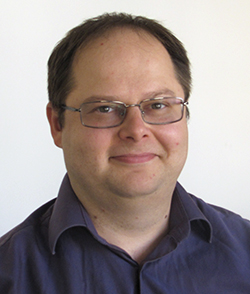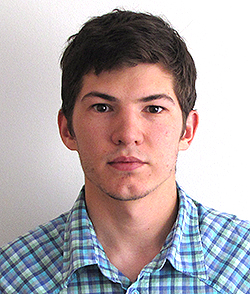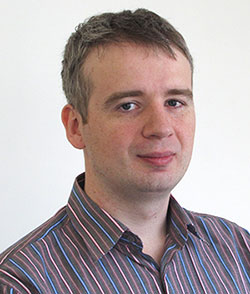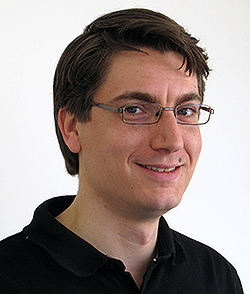Visitors from Finland Join Networking Group
Four visitors from Finland recently joined our Networking and Security Group. They are here as part of ICSI's Finnish visiting program, which is funded by the Finnish Funding Agency for Technology and Innovation through Aalto University and the Helsinki Institute for Information Technology.
 Andrei Gurtov first visited ICSI while working on his PhD with Networking researcher Sally Floyd. He received his degree from the University of Helsinki in 2004. His PhD thesis on transport protocols and wireless networks contributed to IETF protocols, Linux kernel development, and ns-2 simulator. Since 2004, he has been a postdoc, group leader, and principal scientist at the Helsinki Institute for Information Technology. There his research has focused on network security, the Internet of things, and mobile and sensor network protocols. In 2009, he was appointed a professor in the area of wireless networks in the Centre for Wireless Communications, University of Oulu in Finland. He is an author of more than 130 research publications, including two books on Securing Mobile Internet with Host Identity Protocol and on Security and Scalability aspects of Structured P2P Systems. He supervised seven PhD and twenty master theses. His current work at ICSI is on fair bandwidth allocations in data center networks together with Scott Shenker.
Andrei Gurtov first visited ICSI while working on his PhD with Networking researcher Sally Floyd. He received his degree from the University of Helsinki in 2004. His PhD thesis on transport protocols and wireless networks contributed to IETF protocols, Linux kernel development, and ns-2 simulator. Since 2004, he has been a postdoc, group leader, and principal scientist at the Helsinki Institute for Information Technology. There his research has focused on network security, the Internet of things, and mobile and sensor network protocols. In 2009, he was appointed a professor in the area of wireless networks in the Centre for Wireless Communications, University of Oulu in Finland. He is an author of more than 130 research publications, including two books on Securing Mobile Internet with Host Identity Protocol and on Security and Scalability aspects of Structured P2P Systems. He supervised seven PhD and twenty master theses. His current work at ICSI is on fair bandwidth allocations in data center networks together with Scott Shenker.
Andrei is in Berkeley with his wife and two daughters, who are in second and fifth grade. He enjoys sailing, astronomy, fishing, and diving, and he also enjoys traveling and looks forward to seeing some of the natural and theme parks around California. His homepage is at http://www.cs.helsinki.fi/u/gurtov/.
 Dmitriy Kuptsov is also at ICSI for the second time. He is from Uzbekistan. After graduating high school (one year of which he spent in Hamilton, Ohio on an exchange program), he attended Tashkent University for Information Technology in Uzbekistan, receiving a bachelor diploma. He went on to receive a master's degree in computer science at the University of Kuopio in Finland. After working in industry for a year, he began his PhD studies at the Helsinki University of Technology in telecommunications software. He is interested in security and fairness issues in computer networks, and to some extent in network measurements. While here, he intends to work with Scott Shenker on content centric networks. Dmitriy loves eating good food, watching movies with unpredictable outcomes and science channels, and playing soccer. He also loves to design and build remotely controlled planes.
Dmitriy Kuptsov is also at ICSI for the second time. He is from Uzbekistan. After graduating high school (one year of which he spent in Hamilton, Ohio on an exchange program), he attended Tashkent University for Information Technology in Uzbekistan, receiving a bachelor diploma. He went on to receive a master's degree in computer science at the University of Kuopio in Finland. After working in industry for a year, he began his PhD studies at the Helsinki University of Technology in telecommunications software. He is interested in security and fairness issues in computer networks, and to some extent in network measurements. While here, he intends to work with Scott Shenker on content centric networks. Dmitriy loves eating good food, watching movies with unpredictable outcomes and science channels, and playing soccer. He also loves to design and build remotely controlled planes.
 Andrey Lukyanenko was born in Russia and received master's degrees from the University of Petrozavodsk in Russia and the University Kuopio in Finland. In 2010, he received his PhD from the University of Helsinki. His thesis was on protocols for resource sharing in Internet/wireless environments. He also worked on problems related to backoff protocols and reputations in peer-to-peer networks. He stayed in Helsinki to do a postdoctoral fellowship at the Aalto University on information-centric networking. In traditional networking, a request for information is sent from one person - or host - to another. In information-centric networking, pieces of data are assigned identifiers and the host asks for information with its identifier; it doesn't matter which end-host provides the data. While at ICSI, he will work with Scott Shenker on developing and implementing protocols to promote fairness of resource sharing in data centers. In addition to this, he is also interested in mathematical modeling. Andrey is in Berkeley with his wife and son.
Andrey Lukyanenko was born in Russia and received master's degrees from the University of Petrozavodsk in Russia and the University Kuopio in Finland. In 2010, he received his PhD from the University of Helsinki. His thesis was on protocols for resource sharing in Internet/wireless environments. He also worked on problems related to backoff protocols and reputations in peer-to-peer networks. He stayed in Helsinki to do a postdoctoral fellowship at the Aalto University on information-centric networking. In traditional networking, a request for information is sent from one person - or host - to another. In information-centric networking, pieces of data are assigned identifiers and the host asks for information with its identifier; it doesn't matter which end-host provides the data. While at ICSI, he will work with Scott Shenker on developing and implementing protocols to promote fairness of resource sharing in data centers. In addition to this, he is also interested in mathematical modeling. Andrey is in Berkeley with his wife and son.
 André Schumacher attended Darmstadt Technical University, where he received his undergraduate degree, and went on to Aalto University in Finland. His doctoral thesis focused on distributed optimization algorithms, which work through messages passed along a series of nodes, each of which has a limited view of the entire problem. He worked on algorithm analysis and simulations for various problems, such as multipath routing with congestion control, transmission power assignment for network lifetime maximization, and sensor network sleep scheduling. Unrelated to that work, he also collaborated with colleagues at Aalto University on online algorithms for lot sizing, bin packing, and data aggregation problems. After receiving his doctorate in 2010, he began a postdoc in Aalto's distributed computation group, where he worked on designing methods for handling large amounts of data resulting from genome sequencing, which are based on the MapReduce computing framework. Since the rate at which current technologies are producing sequencing data is outpacing conventional processing methods, parallelism is needed in order to make sense of the available data. He plans to continue this work while at ICSI. André is here with his wife, Satu.
André Schumacher attended Darmstadt Technical University, where he received his undergraduate degree, and went on to Aalto University in Finland. His doctoral thesis focused on distributed optimization algorithms, which work through messages passed along a series of nodes, each of which has a limited view of the entire problem. He worked on algorithm analysis and simulations for various problems, such as multipath routing with congestion control, transmission power assignment for network lifetime maximization, and sensor network sleep scheduling. Unrelated to that work, he also collaborated with colleagues at Aalto University on online algorithms for lot sizing, bin packing, and data aggregation problems. After receiving his doctorate in 2010, he began a postdoc in Aalto's distributed computation group, where he worked on designing methods for handling large amounts of data resulting from genome sequencing, which are based on the MapReduce computing framework. Since the rate at which current technologies are producing sequencing data is outpacing conventional processing methods, parallelism is needed in order to make sense of the available data. He plans to continue this work while at ICSI. André is here with his wife, Satu.
